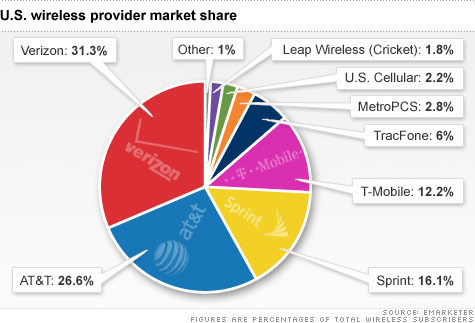
NEW YORK (CNNMoney) -- A harsh ruling against the nation's largest wireless companies last week suggests U.S. regulators aren't going to lie down and let AT&T scoop up T-Mobile without a fight.
On Thursday, the Federal Communications Commission announced that it will force mobile networks to negotiate data roaming agreements with smaller providers. The order was aimed at the biggest carriers, AT&T and Verizon, which have amassed the largest data networks but frequently refused to make deals with smaller competitors.
Every wireless company that filed a comment on the order was in support of it -- except Verizon (VZ, Fortune 500) and AT&T (T, Fortune 500), a fact that FCC Commissioner Julius Genachowski said he couldn't ignore. The FCC's order essentially called the wireless space a duopoly.
Experts say the ruling serves as a harbinger of things to come. The FCC -- along with the Justice Department, one of the two regulators that must approve the AT&T / T-Mobile deal -- will likely demand strict concessions in order to let the proposed merger go through.
"In requiring that large network operators open their networks to roaming, the FCC is showing its hand in how it will deal with ongoing consolidation in the wireless industry," said Dan Hays, a telecom consultant at PRTM. "This latest ruling from the FCC indicates that they are seeking to limit the power and control exerted by the nation's largest network operators."
Typically, in approving wireless mergers, U.S. regulators require very large companies to divest a portion of their stakes in markets in which they are dominant, usually in the form of selling off wireless spectrum. But given AT&T's size and the FCC's recent action, many analysts expect the Commission to go above and beyond the norm when dealing with the proposed merger with T-Mobile.
In addition to divestitures in small markets, most analysts said they expect the FCC to force AT&T to agree to Net neutrality provisions, open standards for network access, and roaming service agreements with smaller players.
Others think the regulator may limit the number or duration of exclusivity agreements that AT&T signs with manufacturers of the hottest new devices. The company's four-year exclusive carrier agreement with Apple (AAPL, Fortune 500) for the iPhone was one of the longest in the industry's history.
Pricing may play a role as well: T-Mobile is one of the largest low-cost carriers with a national footprint. The FCC could impose rate-hike limitations on AT&T and force it to honor T-Mobile customers' agreements for a number of years.
A few experts also said the FCC would likely impose restrictions on AT&T in the amount of wireless spectrum it could buy in the future. More spectrum is needed to prevent bottlenecking, and the Commission is expected to open up for auction 500 MHz of spectrum later this decade. One of AT&T's chief stated reasons for purchasing T-Mobile is to acquire more access to spectrum.
If the merger is approved, AT&T would be the largest wireless provider in the nation by 30%, and both AT&T and Verizon would control more than 70% of the market.
Still, every analyst and expert we spoke to believed the FCC and the DOJ would allow the deal to go through.
The FCC has typically been very open to wireless mergers and has not, until very recently, disputed industry claims of fervent competition. Despite the regulator's "unusual candor" in its ruling last week, Rob Frieden, professor of telecommunications and law at Penn State University, said that the FCC wouldn't dare turn the merger down.
"In this environment, the merger probably goes down subject to rigorous concessions, most of which AT&T will 'volunteer' in the next few months," said Frieden, via e-mail. "On the other hand I don't see the FCC saying no to AT&T."
In fact, many analysts agreed that the FCC's recent "get tough" policy hints that it will try to use concessions rather than roadblocks as a tool to regulate the industry in the future.
"I think this implies that the FCC or the Justice Department will be more likely to approve the merger, since their concerns about harm to rival firms will have been addressed in part through regulation," said Keith Hylton, a professor at Boston University's school of law. ![]()






| Index | Last | Change | % Change |
|---|---|---|---|
| Dow | 32,627.97 | -234.33 | -0.71% |
| Nasdaq | 13,215.24 | 99.07 | 0.76% |
| S&P 500 | 3,913.10 | -2.36 | -0.06% |
| Treasuries | 1.73 | 0.00 | 0.12% |
| Company | Price | Change | % Change |
|---|---|---|---|
| Ford Motor Co | 8.29 | 0.05 | 0.61% |
| Advanced Micro Devic... | 54.59 | 0.70 | 1.30% |
| Cisco Systems Inc | 47.49 | -2.44 | -4.89% |
| General Electric Co | 13.00 | -0.16 | -1.22% |
| Kraft Heinz Co | 27.84 | -2.20 | -7.32% |
|
Bankrupt toy retailer tells bankruptcy court it is looking at possibly reviving the Toys 'R' Us and Babies 'R' Us brands. More |
Land O'Lakes CEO Beth Ford charts her career path, from her first job to becoming the first openly gay CEO at a Fortune 500 company in an interview with CNN's Boss Files. More |
Honda and General Motors are creating a new generation of fully autonomous vehicles. More |
In 1998, Ntsiki Biyela won a scholarship to study wine making. Now she's about to launch her own brand. More |
Whether you hedge inflation or look for a return that outpaces inflation, here's how to prepare. More |